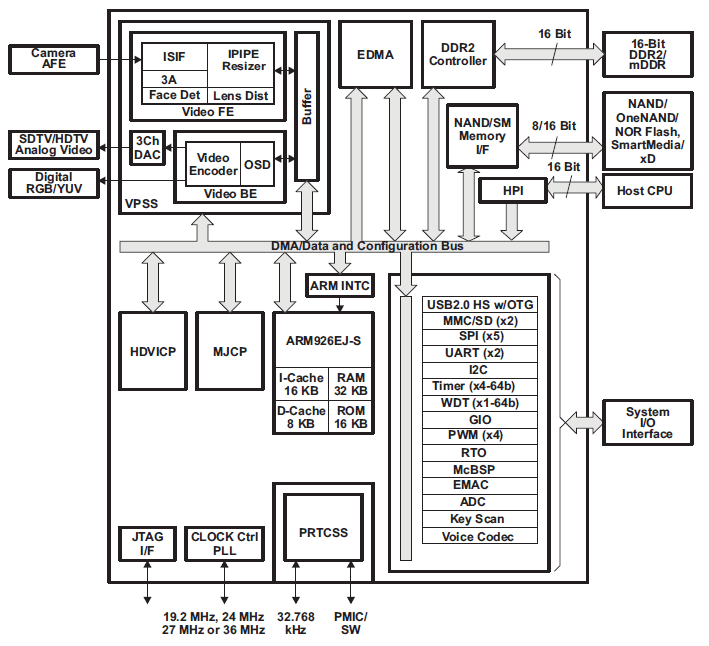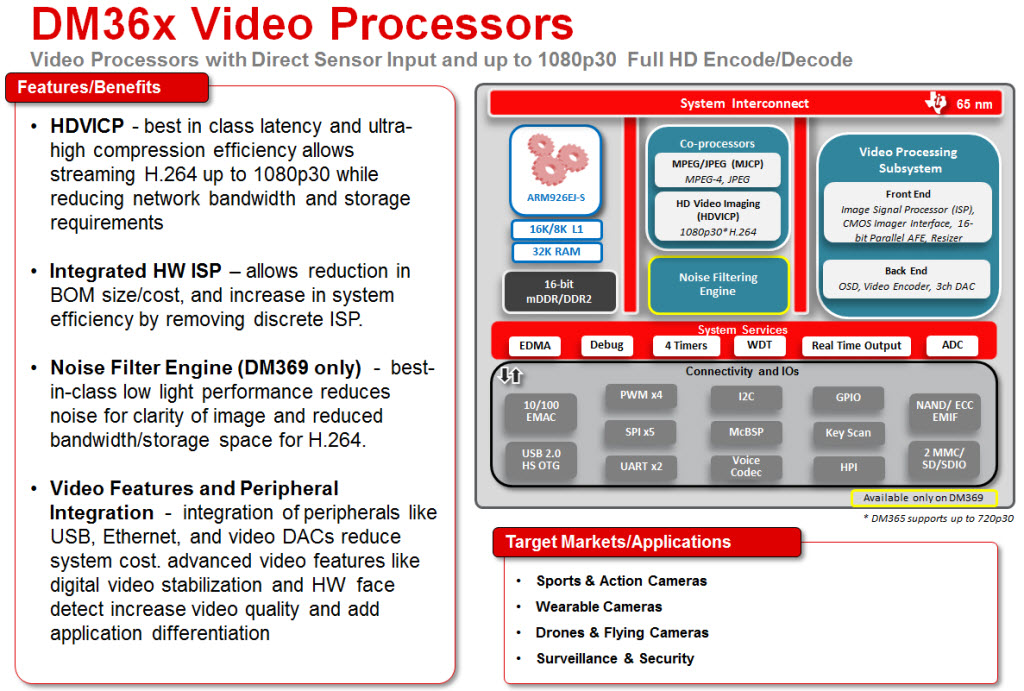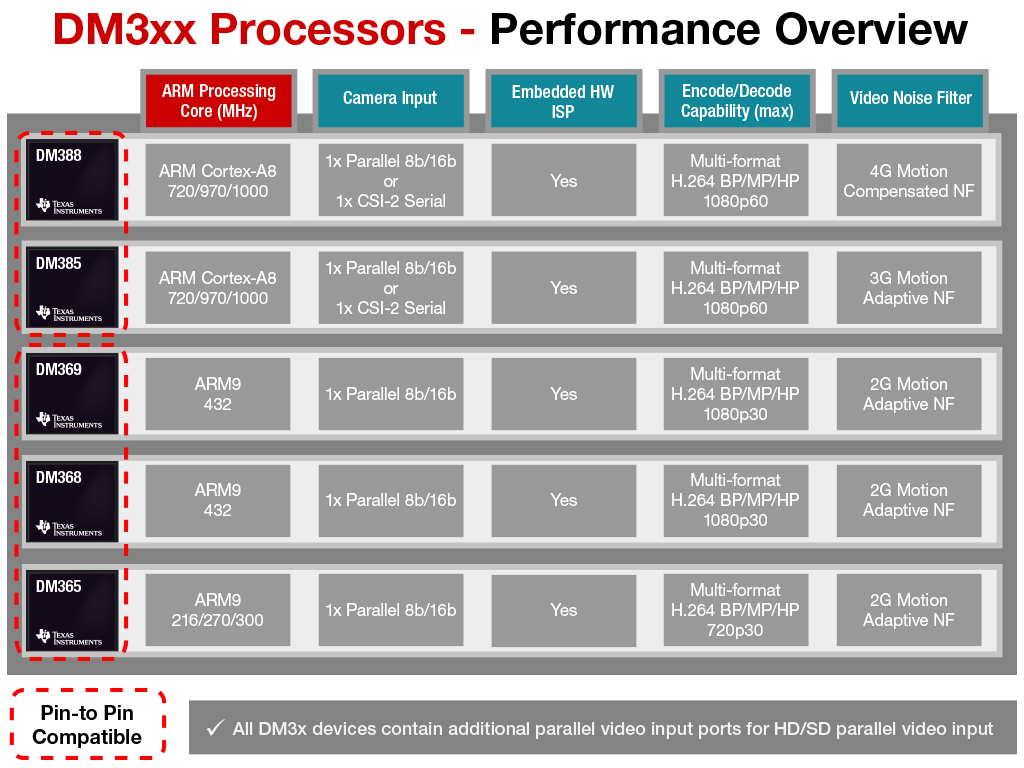描述
开发人员现在可以在数字视频设计中以30fps的速度提供高达720p H.264的像素完美图像,而无需考虑视频格式支持,网络带宽受限新型TMS320DM365数字媒体处理器基于德州仪器(TI)的DaVinci技术,有限的系统存储容量或成本。凭借多格式高清视频,DM365还具有一套外设,可为开发人员节省系统成本。
这款基于ARM9的DM365设备提供高达300 MHz的速度,并支持符合生产要求的H.264,MPEG -4,MPEG-2,MJPEG和VC1 /WMV9编解码器,使客户能够灵活地为其应用选择正确的视频编解码器。这些编解码器由视频加速器驱动,从ARM内核卸载压缩需求,以便开发人员可以利用ARM的最高性能来实现其应用。视频监控设计人员可以实现更高的压缩效率,从而在不影响网络带宽的情媒体播放和相机驱动应用的开发人员,如视频门铃,数字标牌,数字视频录像机,便携式媒体播放器等,可以利用DM365支持的全套编解码器,确保互操作性和产品可扩展性。 /p>
与多格式高清视频一起,DM365可实现与视频应用所需的大多数其他外部设备的无缝接口。图像传感器接口足够灵活,可支持CCD,CMOS和各种其他接口,如BT.656,BT1120。 DM365还提供高清集成,支持高清显示,包括3个内置10位高清模拟视频数模转换器(DAC),DDR2 /mDDR,以太网MAC,USB 2.0,集成音频,主机端口接口( HPI),模数转换器以及更多功能可以为开发人员节省整体系统成本以及电路板上的空间,从而实现更纤薄,更时尚的设计。
特性
-
Highlights
-
High-Performance Digital Media System-on-Chip (DMSoC)
-
Up to 300-MHz ARM926EJ-S Clock Rate
-
Two Video Image Co-processors (HDVICP, MJCP) Engines
-
Supports a Range of Encode, Decode, and Video Quality Operations
-
Video Processing Subsystem
-
HW Face Detect Engine
-
Resize Engine from 1/16x to 8x
-
16-Bit Parallel AFE (Analog Front-End) Interface Up to 120 MHz
-
4:2:2 (8-/16-bit) Interface
-
8-/16-bit YCC and Up to 24-Bit RGB888 Digital Output
-
3 DACs for HD Analog Video Output
-
Hardware On-Screen Display (OSD)
-
Capable of 720p 30fps H.264 video processing
Note: 216-MHz is only capable of D1 processing
-
Peripherals include EMAC, USB 2.0 OTG, DDR2/NAND, 5 SPIs, 2 UARTs, 2 MMC/SD/SDIO, Key Scan
-
8 Different Boot Modes and Configurable Power-Saving Modes
-
Pin-to-pin and software compatible with DM368
-
Extended temperature (-40°C - 85°C) available for 300-Mhz device
-
3.3-V and 1.8-V I/O, 1.2-V/1.35-V Core
-
338-Pin Ball Grid Array at 65nm Process Technology
-
High-Performance Digital Media System-on-Chip (DMSoC)
-
216-, 270-, 300-MHz ARM926EJ-S Clock Rate
-
Fully Software-Compatible With ARM9™
-
ARM926EJ-S™ Core
-
Support for 32-Bit and 16-Bit (Thumb® Mode) Instruction Sets
-
DSP Instruction Extensions and Single Cycle MAC
-
ARM® Jazelle® Technology
-
EmbeddedICE-RT Logic for Real-Time Debug
-
ARM9 Memory Architecture
-
16K-Byte Instruction Cache
-
8K-Byte Data Cache
-
32K-Byte RAM
-
16K-Byte ROM
-
Little Endian
-
Two Video Image Co-processors (HDVICP, MJCP) Engines
-
Support a Range of Encode and Decode Operations
-
H.264, MPEG4, MPEG2, MJPEG, JPEG, WMV9/VC1
-
Video Processing Subsystem
-
Front End Provides:
-
HW Face Detect Engine
-
Hardware IPIPE for Real-Time Image Processing
-
Resize Engine
-
Resize Images From 1/16× to 8×
-
Separate Horizontal/Vertical Control
-
Two Simultaneous Output Paths
-
IPIPE Interface (IPIPEIF)
-
Image Sensor Interface (ISIF) and CMOS Imager Interface
-
16-Bit Parallel AFE (Analog Front End) Interface Up to 120 MHz
-
Glueless Interface to Common Video Decoders
-
BT.601/BT.656/BT.1120 Digital YCbCr 4:2:2 (8-/16-Bit Module
-
Histogram Module
-
Lens distortion correction module (LDC)
-
Hardware 3A statistics collection module (H3A)
-
Back End Provides:
-
Hardware On-Screen Display (OSD)
-
Composite NTSC/PAL video encoder output
-
8-/16-bit YCC and Up to 24-Bit RGB888 Digital Output
-
3 DACs for HD Analog Video Output
-
LCD Controller
-
BT.601/BT.656 Digital YCbCr 4:2:2 (8-/16-Bit) Interface
-
Analog-to-Digital Convertor (ADC)
-
Power Management and Real Time Clock Subsystem (PRTCSS)
-
16-Bit Host-Port Interface (HPI)
-
10/100 Mb/s Ethernet Media Access Controller (EMAC) - Digital Media
-
IEEE 802.3 Compliant
-
Supports Media Independent Interface (MII)
-
Management Data I/O (MDIO) Module
-
Key Scan
-
Voice Codec
-
External Memory Interfaces (EMIFs)
-
DDR2 and mDDR SDRAM 16-bit wide EMIF With 256 MByte Address Space (1.8-V I/O)
-
Asynchronous16-/8-bit Wide EMIF (AEMIF)
-
Flash Memory Interfaces
-
NAND (8-/16-bit Wide Data)
-
16 MB NOR Flash, SRAM
-
OneNAND(16-bit Wide Data)
-
Flash Card Interfaces
-
Two Multimedia Card (MMC) / Secure Digital (SD/SDIO)
-
SmartMedia/xD
-
Enhanced Direct-Memory-Access (EDMA) Controller (64 Independent Channels)
-
USB port with Integrated 2.0 High-Speed PHY that Supports
-
USB 2.0 High-Speed Device
-
USB 2.0 High-Speed Host (mini-host, supporting one external device)
-
USB On The Go (HS-USB OTG)
-
Four 64-Bit General-Purpose Timers (each configurable as two 32-bit timers)
-
One 64-Bit Watch Dog Timer
-
Two UARTs (One fast UART with RTS and CTS Flow Control)
-
Five Serial Port Interfaces (SPI) each with two Chip-Selects
-
One Master/Slave Inter-Integrated Circuit (I2C) Bus™
-
One Multi-Channel Buffered Serial Port (McBSP)
-
I2S
-
AC97 Audio Codec Interface
-
S/PDIF via Software
-
Standard Voice Codec Interface (AIC12)
-
SPI Protocol (Master Mode Only)
-
Direct Interface to T1/E1 Framers
-
Time Division Multiplexed Mode (TDM)
-
128 Channel Mode
-
Four Pulse Width Modulator (PWM) Outputs
-
Four RTO (Real Time Out) Outputs
-
Up to 104 General-Purpose I/O (GPIO) Pins (Multiplexed with Other Device Functions)
-
Boot Modes
-
On-Chip ARM ROM Bootloader (RBL) to Boot From NAND Flash, MMC/SD, UART, USB, SPI, EMAC, or HPI
-
AEMIF (NOR and OneNAND)
-
Configurable Power-Saving Modes
-
Crystal or External Clock Input (typically 19.2 Mhz, 24 MHz, 27 Mhz or 36 MHz)
-
Flexible PLL Clock Generators
-
Debug Interface Support
-
IEEE-1149.1 (JTAG™) Boundary-Scan-Compatible
-
ETB (Embedded Trace Buffer) with 4K-Bytes Trace Buffer memory
-
Device Revision ID Readable by ARM
-
338-Pin Ball Grid Array (BGA) Package (ZCE Suffix), 0.65-mm Ball Pitch
-
65nm Process Technology
-
3.3-V and 1.8-V I/O, 1.2-V/ 1.35-V Internal
-
Community Reesources
-
TI E2E Community
-
TI Embedded Processors Wiki
Please be aware that an important notice concerning availability, standard warranty, and use in critical applications of Texas Instruments semiconductor products and disclaimers thereto appears at the end of this document.
Windows is a trademark of Microsoft.
All other trademarks are the property of their respective owners.
参数 与其它产品相比 数字视频处理器
|
|
|
Applications |
|
Operating Systems |
|
Arm CPU |
|
Arm MHz (Max.) |
|
DSP |
|
DSP MHz |
|
Video Acceleration |
|
Video Resolution/Frame Rate |
|
Video Port (Configurable) |
|
USB |
|
PCI/PCIe |
|
EMAC |
|
DRAM |
|
SPI |
|
I2C |
|
UART (SCI) |
|
On-Chip L2 Cache/RAM |
|
Operating Temperature Range (C) |
|
Pin/Package |
|
|
|
TMS320DM365 |
TMS320DM368 |
TMS320DM369 |
Consumer Electronics
Industrial Cameras
Security
Video and Imaging
Portable Cameras
Video Surveillance IP Cameras |
Consumer Electronics
Industrial Cameras
Security
Video and Imaging
Portable Cameras
Video Surveillance IP Cameras |
Consumer Electronics
Industrial Cameras
Security
Video and Imaging
Portable Cameras
Video Surveillance IP Cameras |
|
Linux |
Linux |
Linux |
|
1 ARM9 |
1 ARM9 |
1 ARM9 |
|
300 |
432 |
432 |
|
0 |
0 |
0 |
|
0 |
0 |
0 |
1 MJCP
1 HDVICP |
1 MJCP
1 HDVICP |
1 MJCP
1 HDVICP |
720P
30 FPS |
1080P
30 FPS or Less |
1080P
30 FPS or less |
1 Dedicated Input
1 Dedicated Output |
1 Dedicated Input
1 Dedicated Output |
1 Dedicated Input
1 Dedicated Output |
USB2.0
HS
OTG |
USB2.0
HS
OTG |
USB2.0 HS OTG |
|
0 |
0 |
0 |
|
10/100 |
10/100 |
10/100 |
LPDDR
DDR2 |
LPDDR
DDR2 |
LPDDR
DDR2 |
|
5 |
5 |
5 |
|
1 |
1 |
1 |
|
2 |
2 |
2 |
|
0 |
0 |
0 |
-40 to 85
0 to 85 |
-40 to 85
0 to 85 |
-40 to 85
0 to 85 |
|
338NFBGA |
338NFBGA |
338NFBGA |
|
|
|
|



